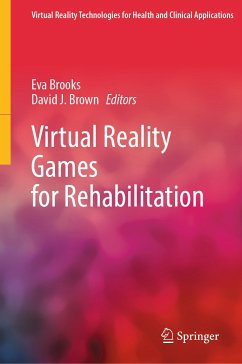Virtual Reality Games for Rehabilitation (eBook, PDF)
139,99 €
inkl. MwSt.
Sofort per Download lieferbar

0 °P sammeln
Virtual Reality Games for Rehabilitation (eBook, PDF)
- Format: PDF
- Merkliste
- Auf die Merkliste
- Bewerten Bewerten
- Teilen
- Produkt teilen
- Produkterinnerung
- Produkterinnerung

Bitte loggen Sie sich zunächst in Ihr Kundenkonto ein oder registrieren Sie sich bei
bücher.de, um das eBook-Abo tolino select nutzen zu können.
Hier können Sie sich einloggen
Hier können Sie sich einloggen
Sie sind bereits eingeloggt. Klicken Sie auf 2. tolino select Abo, um fortzufahren.

Bitte loggen Sie sich zunächst in Ihr Kundenkonto ein oder registrieren Sie sich bei bücher.de, um das eBook-Abo tolino select nutzen zu können.
This volume focuses on games to manage and facilitate rehabilitation. It emphasizes user practice, attitudes, and experience, and their changing place within developing rehabilitation frameworks. It looks at how users have adopted, integrated, and innovated with games to facilitate rehabilitation. Topics include game technology, game design and accessibility, web-based technologies vs pervasive and mobile technologies, social and collaborative aspects, and rehabilitative outcome. Games for rehabilitation are gaining interest from different communities such as medicine, psychology, and…mehr
- Geräte: PC
- ohne Kopierschutz
- eBook Hilfe
- Größe: 9.68MB
- Upload möglich
Andere Kunden interessierten sich auch für
![Speeksel, speekselklieren en mondgezondheid (eBook, PDF) Speeksel, speekselklieren en mondgezondheid (eBook, PDF)]() A. van Nieuw AmerongenSpeeksel, speekselklieren en mondgezondheid (eBook, PDF)119,99 €
A. van Nieuw AmerongenSpeeksel, speekselklieren en mondgezondheid (eBook, PDF)119,99 €![Het voeding formularium (eBook, PDF) Het voeding formularium (eBook, PDF)]() M. GeleijnseHet voeding formularium (eBook, PDF)29,99 €
M. GeleijnseHet voeding formularium (eBook, PDF)29,99 €![Praktijkboek Reumatische Voeten (eBook, PDF) Praktijkboek Reumatische Voeten (eBook, PDF)]() W. Drossaers-BakkerPraktijkboek Reumatische Voeten (eBook, PDF)11,25 €
W. Drossaers-BakkerPraktijkboek Reumatische Voeten (eBook, PDF)11,25 €![Van etiket naar diagnose (eBook, PDF) Van etiket naar diagnose (eBook, PDF)]() Jelle KapiteinVan etiket naar diagnose (eBook, PDF)49,99 €
Jelle KapiteinVan etiket naar diagnose (eBook, PDF)49,99 €![Epilepsie (eBook, PDF) Epilepsie (eBook, PDF)]() Boudewijn GunningEpilepsie (eBook, PDF)59,99 €
Boudewijn GunningEpilepsie (eBook, PDF)59,99 €![Het sport-medisch formularium (eBook, PDF) Het sport-medisch formularium (eBook, PDF)]() W.L. MosterdHet sport-medisch formularium (eBook, PDF)36,99 €
W.L. MosterdHet sport-medisch formularium (eBook, PDF)36,99 €![Handboek farmaceutische geneeskunde (eBook, PDF) Handboek farmaceutische geneeskunde (eBook, PDF)]() Handboek farmaceutische geneeskunde (eBook, PDF)74,99 €
Handboek farmaceutische geneeskunde (eBook, PDF)74,99 €-
-
-
This volume focuses on games to manage and facilitate rehabilitation. It emphasizes user practice, attitudes, and experience, and their changing place within developing rehabilitation frameworks. It looks at how users have adopted, integrated, and innovated with games to facilitate rehabilitation. Topics include game technology, game design and accessibility, web-based technologies vs pervasive and mobile technologies, social and collaborative aspects, and rehabilitative outcome. Games for rehabilitation are gaining interest from different communities such as medicine, psychology, and rehabilitation. A distinction can be made between games specifically made for rehabilitative purposes and games made for the general public but that are used in rehabilitation as well. Games have allowed the building of new/complementary forms for rehabilitation and offered new options to produce rehabilitative activities and experiences.
Produktdetails
- Produktdetails
- Verlag: Springer New York
- Erscheinungstermin: 12. September 2023
- Englisch
- ISBN-13: 9781071633717
- Artikelnr.: 70263337
- Verlag: Springer New York
- Erscheinungstermin: 12. September 2023
- Englisch
- ISBN-13: 9781071633717
- Artikelnr.: 70263337
- Herstellerkennzeichnung Die Herstellerinformationen sind derzeit nicht verfügbar.
Eva Brooks, Ph.D., is Professor of IT-based Design, Learning and Innovation, and Director of the research laboratory Xlab – Design, Learning, Innovation at Aalborg University, Denmark and Visiting Professor at Halmstad University, Sweden. She is founder and steering co-chair of the EAI International Conference of Design, Learning & Innovation. Her research has a participatory design focus on social interaction and the use of digital technologies including their implications on play and learning in different learning practices. She has been leading several national and international projects in the area of her research interest. Currently, she is leading a Nordic project on Computational Play in Early Childhood Education.
David Brown, Ph.D., is Professor of Interactive Systems for Social Inclusion at Nottingham Trent University and Director of the Computing and Informatics Research Centre and Research Group Leader for Interactive Systems. Heis EU Project Coordinator for several projects concerning accessible game-based learning and multimodal adaptive learning systems for the education and rehabilitation of people with disabilities. Dr. Brown is a member of the International Steering Committee of the International Conference of Disability, Virtual Reality and Associated Technology (ICDVRAT) and Associate Editor for Frontiers: Virtual Reality in Medicine.
David Brown, Ph.D., is Professor of Interactive Systems for Social Inclusion at Nottingham Trent University and Director of the Computing and Informatics Research Centre and Research Group Leader for Interactive Systems. Heis EU Project Coordinator for several projects concerning accessible game-based learning and multimodal adaptive learning systems for the education and rehabilitation of people with disabilities. Dr. Brown is a member of the International Steering Committee of the International Conference of Disability, Virtual Reality and Associated Technology (ICDVRAT) and Associate Editor for Frontiers: Virtual Reality in Medicine.
Preface.- Introduction.- 1. Games for stroke rehabilitation an overview.- 2. A Framework for Designing Tabletop Games in Group-based Motor Rehabilitation.- 3. The Role of VR Simulation and Game Technology in the Understanding and Treatment of Visual Impairments.- 4. Methodology for the Co-Design of shared VR environments with adults with developmental and intellectual disabilities using the Oculus Quest.- 5. Amplifying Ability: Engaging Young People with Autism Spectrum Disorders through Gesture, Movement and Sound Technologies.- 6. Investigating the Effectiveness of Paper-Based and Computer-Presented Social Stories for Children with Autism Spectrum Conditions in an Autism-Specific Special School.- 7. A Colour-Coded Analysis of Movement Dynamics Associated to Potentials of Motion-Based Commercial Games to Supplement Training of Patients Diagnosed with Fibromyalgia Syndrome.- 8. The design, development, and evaluation of an accessible serious gaming system for children with cerebral palsy.- 9. Designing a general open authorable digital ecosystem for educational games to support special learning needs.- 10. How does the alteration of an avatar’s proportions affect experience and performance when controlling it?.- 11. Video Games for Players with Visual Disabilities.
Preface.- Introduction.- 1. Games for stroke rehabilitation an overview.- 2. A Framework for Designing Tabletop Games in Group-based Motor Rehabilitation.- 3. The Role of VR Simulation and Game Technology in the Understanding and Treatment of Visual Impairments.- 4. Methodology for the Co-Design of shared VR environments with adults with developmental and intellectual disabilities using the Oculus Quest.- 5. Amplifying Ability: Engaging Young People with Autism Spectrum Disorders through Gesture, Movement and Sound Technologies.- 6. Investigating the Effectiveness of Paper-Based and Computer-Presented Social Stories for Children with Autism Spectrum Conditions in an Autism-Specific Special School.- 7. A Colour-Coded Analysis of Movement Dynamics Associated to Potentials of Motion-Based Commercial Games to Supplement Training of Patients Diagnosed with Fibromyalgia Syndrome.- 8. The design, development, and evaluation of an accessible serious gaming system for children with cerebral palsy.- 9. Designing a general open authorable digital ecosystem for educational games to support special learning needs.- 10. How does the alteration of an avatar's proportions affect experience and performance when controlling it?.- 11. Video Games for Players with Visual Disabilities.
Preface.- Introduction.- 1. Games for stroke rehabilitation an overview.- 2. A Framework for Designing Tabletop Games in Group-based Motor Rehabilitation.- 3. The Role of VR Simulation and Game Technology in the Understanding and Treatment of Visual Impairments.- 4. Methodology for the Co-Design of shared VR environments with adults with developmental and intellectual disabilities using the Oculus Quest.- 5. Amplifying Ability: Engaging Young People with Autism Spectrum Disorders through Gesture, Movement and Sound Technologies.- 6. Investigating the Effectiveness of Paper-Based and Computer-Presented Social Stories for Children with Autism Spectrum Conditions in an Autism-Specific Special School.- 7. A Colour-Coded Analysis of Movement Dynamics Associated to Potentials of Motion-Based Commercial Games to Supplement Training of Patients Diagnosed with Fibromyalgia Syndrome.- 8. The design, development, and evaluation of an accessible serious gaming system for children with cerebral palsy.- 9. Designing a general open authorable digital ecosystem for educational games to support special learning needs.- 10. How does the alteration of an avatar’s proportions affect experience and performance when controlling it?.- 11. Video Games for Players with Visual Disabilities.
Preface.- Introduction.- 1. Games for stroke rehabilitation an overview.- 2. A Framework for Designing Tabletop Games in Group-based Motor Rehabilitation.- 3. The Role of VR Simulation and Game Technology in the Understanding and Treatment of Visual Impairments.- 4. Methodology for the Co-Design of shared VR environments with adults with developmental and intellectual disabilities using the Oculus Quest.- 5. Amplifying Ability: Engaging Young People with Autism Spectrum Disorders through Gesture, Movement and Sound Technologies.- 6. Investigating the Effectiveness of Paper-Based and Computer-Presented Social Stories for Children with Autism Spectrum Conditions in an Autism-Specific Special School.- 7. A Colour-Coded Analysis of Movement Dynamics Associated to Potentials of Motion-Based Commercial Games to Supplement Training of Patients Diagnosed with Fibromyalgia Syndrome.- 8. The design, development, and evaluation of an accessible serious gaming system for children with cerebral palsy.- 9. Designing a general open authorable digital ecosystem for educational games to support special learning needs.- 10. How does the alteration of an avatar's proportions affect experience and performance when controlling it?.- 11. Video Games for Players with Visual Disabilities.







